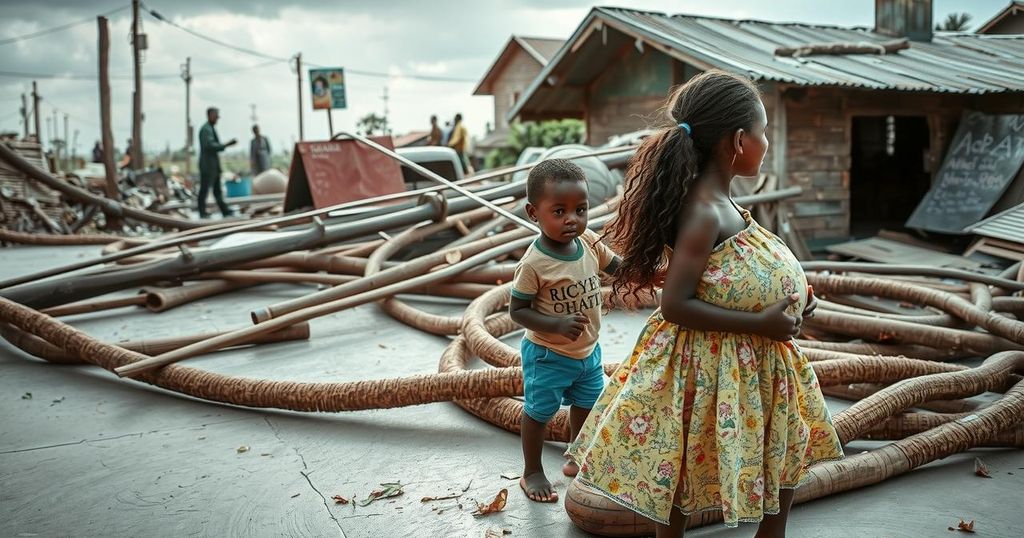Cyclone Chido Devastates Mozambique, Affecting 90,000 Children
Cyclone Chido struck Mozambique’s Cabo Delgado province, destroying over 35,000 homes and affecting 90,000 children. The cyclone’s damage includes destroyed classrooms and health facilities, compounding the existing humanitarian crisis exacerbated by conflict and disease. UNICEF is mobilizing emergency responses amid these challenges, seeking urgent funding to assist the impacted population.
Cyclone Chido has severely impacted Cabo Delgado province in Mozambique, damaging or destroying over 35,000 homes and affecting an estimated 90,000 children. The cyclone, which struck on December 17, 2024, has not only devastated civilian infrastructure but has also destroyed at least 186 classrooms and damaged 20 health facilities. The children of Mozambique already contend with significant adversities stemming from prolonged conflicts, drought, and disease outbreaks, exacerbating the humanitarian crisis.
UNICEF, along with government and local partners, is mobilizing rapid humanitarian responses amidst these challenges, prioritizing emergency action to aid affected communities. The cyclone also caused widespread destruction in the Nampula and Niassa provinces, leaving numerous families without electricity and further complicating the ongoing cholera outbreak. The situation in Cabo Delgado is dire, as it has been marred by conflict for over seven years, leading to substantial internal displacement.
The wider impact of environmental factors, including the El Niño and La Niña weather cycles, is projected to escalate food insecurity across the region. Over 4.8 million people currently require humanitarian assistance, with UNICEF urgently seeking US$10 million to address the immediate needs stemming from the cyclone’s destruction. As climate-related challenges escalate, the ability of agencies like UNICEF to respond swiftly and effectively becomes increasingly crucial.
Support and funding are imperative for the ongoing humanitarian response in Mozambique in light of Cyclone Chido’s profound destruction. The continued partnership between governmental and non-governmental organizations remains essential for delivering aid and rebuilding efforts in the affected regions.
Cyclone Chido’s devastation in Mozambique highlights the escalating impact of climate change on the region. Mozambique is recognized as one of the countries most affected by climate change, and the devastation from Cyclone Chido follows a series of other severe weather events disrupting the lives of its citizens. This includes heightened food insecurity, health crises, and prolonged conflict, all converging to create a humanitarian emergency. With approximately 4.8 million individuals requiring assistance, the scale of support needed is daunting, demanding immediate international attention and aid. Concerns surrounding waterborne diseases due to damaged infrastructure further threaten the health and safety of the population, especially children.
Cyclone Chido has exacerbated the already critical humanitarian situation in Mozambique, impacting tens of thousands of children and thousands of homes. The compounded effects of ongoing conflict, climate change, and pre-existing health crises necessitate a coordinated and urgent response from UNICEF and international aid organizations. Continued support and funding are essential to address the immediate and ongoing needs of affected communities as Mozambique navigates this multifaceted crisis.
Original Source: reliefweb.int




Post Comment